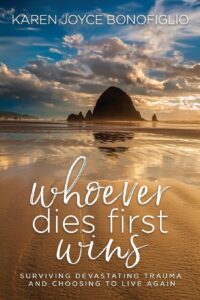
Written Literary Conversations with Nora D’Ecclesis
featuring Karen Joyce Bonofiglio, Author
Whoever Dies First Wins: Surviving Devastating Trauma and Choosing to Live Again

Nora D’Ecclesis: Karen, what is your next literary publication as a published author? Will you continue to write nonfiction, and if so, what topic is of interest to you?
Karen Bonofiglio: I currently have two literary publications that I plan to explore. Both publications deal with grief but in different ways. The first is a children’s book dealing with the death of a father, written from a family dog’s viewpoint on what happens when the children’s father dies. This will be explained in an understandable and simplistic viewpoint suitable for a family setting to share the story of death or in an elementary school setting. The second book is nonfiction and a “how-to” book. Many women need to acquire the skills they never learned in a relationship, such as how to do things their partner takes care of. I found that I hardly knew anything and I never wanted to be pitied for my loss. It was hard to ask for help. This book will delve into how you can have the knowledge to run the household, celebrate your success, claim back your power as it is lost with the onset of grief, and learn about how to cope. It is a book designed to learn about who we are.
Nora: The only constant is change. How do you think change can be a positive after the loss of a partner?
Karen: When I experienced my second divorce, I took many self-help seminars and had a shirt made with one of their mantras, “Change is inevitable, misery is optional. I honor grief. I honor every tear that falls, each ache in my heart, and however the grief wants to rear its ugly head. Grief changes you; it changes your thought patterns, messes with your mind, and you can feel very disempowered. I look back on where I was at the beginning of my grief journey and where I am now, four years later. I wanted to die.
I didn’t think I could survive in this world on my own. My light and power were just a flicker inside my being. Yet, I look at myself now and what I have done with that grief; I am a “new and improved” Karen. I celebrate every”victory” I accomplish on my own and feel pride in my achievements. Forcing myself to honor the feelings of grief and not stuffing it away took me down a different path than constant misery.
Nora: Fall off the horse seven times and get on eight, as the Zen saying teaches us. Do you metaphorically experience the positive impact of that advice while riding your Mustang Apache?
Karen: Apache was a strong-willed horse whose main purpose on most of our rides was to buck me off. She wanted to show that she was the boss. I learned so much from that beautiful animal. When you are on the back of a horse, riding through trails, along streams, and up and down hills, you are one with the horse and nature. This oneness connects you with everything in your sphere and brings you closer to all. The horse can feel this and knows it; it is very spiritual and meditative.
I have never felt more alive than when I was on the back of Apache. The connections were incredible. I have lost my father, mother, and husband, the love of my life, five kitties, and three doggies while married to Bono. Apache taught me to get back up and get back on her. Apache taught me to keep moving forward in my life.
Nora: The joy of being enveloped in a husband’s arms, protected, cherished, and safe, is beautiful and a difficult loss after death; who now cares for the widow after such a loss?
Karen: When Bono died, I did not want pity from anyone. I found it hard to ask for help even though I needed it. Eating alone without my husband sitting across the table from me was so depleting. I learned to lean on my friends. I learned to ask for help. I would dare say that everyone in your tribe wants to help you. They want to help you through the process even if they don’t know how to do it. One of my friends was cross with me a couple of times when I did not ask for help. This was so hard for me. I wanted to be strong; I didn’t want pity. Yet, no one was pitying me; they genuinely wanted to help me through this ordeal. Who takes care of the widow after such a horrendous loss? Me! I must dig deep inside to my innermost core with my friends by my side.
Nora: The Janda Club for Widows sounds interesting. Please describe your plans for this grief group.
Karen: I started Janda Sisters as a safe place for widows to express themselves to others who had lost their husbands. The ladies in the group remarked how much my experience has helped them, and sometimes I feel too forthright, but they wanted to know exactly what they may experience. The group ebbs and flows. Due to the nature of our lives, some of the sisters have gone behind the veil, yet we welcome all widows into the club when they are ready. I thought there might be other small chapters in the area to accommodate travel restrictions. I have no formal plans for this group, just a soft place to land in a cold and brutal environment.
I have teamed up with a psychologist, and we meet as a grief group every other week. We have found this beneficial for both of us. She is learning from me as she has not experienced extreme grief, and I have learned so much working with people in grief. Grief deals with different types of loss. One participant helped her mom die, using “Death with Dignity”; another couple suffered the suicide of their adult son, and so forth. We all can help and support each other. I have to hold myself back and let them contemplate and think about their wants and needs; this has helped me immensely. I am a retired school teacher and a strong Virgo, so I am very much used to being in charge and having everything run systematically. I have found there are many ways to attain the same goal.
Nora: Your book’s concept of ADC is fascinating. Please explain it.
Karen: ADC is fascinating!!! After Death Communication is the belief that we can communicate with our loved ones once they have transitioned. What would happen if, after our loved one died, you could pick up the phone and talk to them? How would that feel? Would you feel closer and more connected if you could do that? Would you feel they were really here and not gone forever into the heavenly realms? Would you realize that they were not really dead and gone? ADC is such a phenomenal way to connect with people who have transitioned. Spirit is unencumbered! They are free to go wherever they desire, and we can learn to communicate with them.
One of the most important factors is trust. Know if you receive a message that you actually did receive it and are not just creating this in your imagination. ADC comes in a variety of ways. You may find feathers or coins in unexpected places. Dreams are a common way to see or feel your loved one. You may see a shadow, lights may flicker, tv’s may turn on and off. You may hear a voice clearly or in your mind. Some spirits can present themselves as an apparition and will look like when you knew them, or perhaps younger. There are multitudes of ways spirit tries to get your attention. While moving forward, the best thing is to keep our minds open to the multitude of possibilities of After Death Communication.
Nora: In your book, you write several examples of the concept of hell in the afterlife, and in your opinion, it does not exist as many faith-based religions teach it. All major religions teach the traditional concept, why then do you believe that could change for a milder version or simply be omitted?
Karen: God has been presented to be all loving and loving us unconditionally. If this is written in holy books, why would God judge us and send us to a fiery inferno forever? It simply does not make sense. I believe we make our own hell, and it is not a place that you go to for eternity. In my opinion, hell was created by religious leaders to influence the populace. If you do this, you are damned to hell. Follow us; we will redeem your transgressions and not be eternally condemned.
Nora: Growing through the grief process seems universal. Why do we not grow while in partnership?
Karen: When my husband died, and I asked him why, I was told, “For your growth,” which created a mental disquietude. I told him I could grow even if he were here. But that is not true. I would not have grown as a person if I had only suffered my parents’ deaths. The catalyst for my growth was when my husband left this earth. I would tell my friends that I didn’t recognize myself and could tell they did not understand. I exposed myself to the world and learned to come from a place of vulnerability. I expanded. I changed internally as a person. I was the “new and improved” version of Karen. Now, my single purpose in life is to help others navigate this world of loss, trauma, and grief.
To find out more about Karen and the book Whoever Dies First Wins, visit the websites: